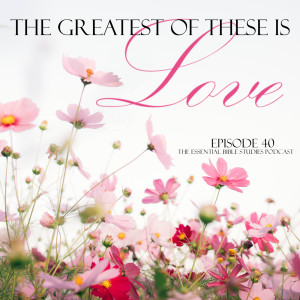
Could there be any more beautifully expressed words then Paul's exposition on love in 1 Corinthians 13? Join Brian and Tim and as they talk about the Greek words for love to get a better understanding of how to love like Christ. They then go on to explore each phrase and consider what it means for us in our life of discipleship.
Key Verse:
“So now faith, hope, and love abide, these three; but the greatest of these is love.” 1 Corinthians 13:13
Handouts:
1 Corinthians 13 Version Comparison Spreadsheet
1 Corinthians 13 Comparison with Exodus 34
1 Corinthians 13 Comparison with Galatians 5
Show Notes:
Definitions of the Greek words for love
- Agape (Strong G25, G25 and G27) - to love (in a social or moral sense)
- Phileo (Strongs G5368) to be a friend to (fond of (an individual or an object)), i.e. have affection for (denoting personal attachment, as a matter of sentiment or feeling; while agape is wider, embracing especially the judgment and the deliberate assent of the will as a matter of principle, duty and propriety: the two thus stand related very much as G2309 and G1014, or as G2372 and G3563 respectively; the former being chiefly of the heart and the latter of the head)
- Root G5384 philos - properly dear, ie. a friend
- Used as a root of several other words. G5386 philosophos - philosopher, fond of wise things
Quotes about love
- Agape is “the love that flows from a person’s association with God’s purpose in Christ, a principled love that is not free from passion, but is not driven by passion.” - Michael Ashton, The Christadelphian Magazine, 2002.
- “the Greek agape takes on a special meaning: it is used to designate a volitional (or relating to one’s will) love as opposed to the purely emotional kind. It is a self-sacrificial love, a kind naturally expressed by God.” – Stephen Whitehouse, The Christadelphian Magazine, 2009.
Special verse that define agape love as self sacrificing (John 15:13; Rom. 5:8; John 3:16).
The beautiful definition of love in 1 Corinthians 13
- Appreciating the context and comparing different versions.
- Similarities between 1 Cor. 13 and the character of God in Ex. 34:6-7 and the fruits of the spirit in Gal. 5:22-23.
Breaking down 1 Corinthians 13
- “Love is patient and kind” compare Eph. 4:1-3. “Kindness is love communicating” Dennis Gillet, Genius of Discipleship
- “love does not envy or boast; it is not arrogant”. KJV “not puffed up”. This was a problem with the Corinthians (4:6, 18, 19; 5:2; 8:1)
- “love is not rude”
- “It does not insist on its own way”, not self-centered
- “it is not irritable”, that is, not easily provoked to anger.
- “or resentful” literally mean to not keep a record of wrongs. Doesn’t hold grudges.
- “it does not rejoice at wrongdoing, but rejoices with the truth.”
- Two ways of interpreting this – love does not gloat over the wickedness of others (Ezek. 33:11) and love does not overlook error but speaks the truth (2 Tim. 2:17; Eph. 4:15)
- “Love bears all things”. Literally means to cover over like a roof. Compare Prov. 10:12; 17:9
- “believes all things, hopes all things, endures all things.”
- Love includes faith (belief) and hope
In the Kingdom there will be no need for faith (Heb. 11:1) or hope (Rom. 8:24) but love will endure.
J.B. Phillips translation of 1 Cor. 13:7-8 “Love knows no limit to its endurance, no end to its trust, no fading of its hope; it can outlast anything. It is, in fact, the one thing that still stands when all else has fallen.”
Follow us on...
Facebook: https://www.facebook.com/essentialbiblestudies
Instagram: https://www.instagram.com/essentialbiblestudies/
X: https://x.com/bible_podcast
Get it...
Get an invite to our Tuesday night Bible Studies at essentialbiblestudies.org
Request a free Essential Bible Studies media kit
No comments yet. Be the first to say something!